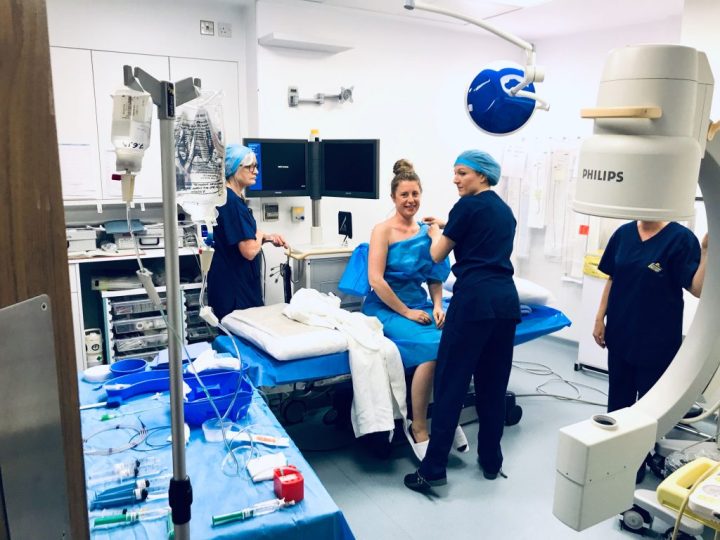Pelvic Congestion Syndrome is an under-diagnosed and mis-diagnosed cause of chronic pelvic pain. Finding a skilled physician to treat it is fairly difficult. In this post and video interview with Dr. David Beckett, you will discover how to find a qualified interventional radiologist to treat Pelvic Congestion Syndrome so you can ask questions and advocate for yourself!

If you’ve been diagnosed with Pelvic Congestion Syndrome and are seeking treatment for this condition, you will find this an invaluable resource!
The typical path of diagnoses and treatment for Pelvic Congestion Syndrome is often long and arduous for many women and men. Pelvic Congestion Syndrome is rarely on the radar as a possible cause of chronic pelvic pain — though it affects up to 30% of women worldwide. Often, many specialists, including gynecologists, gastroenterologists, and urologists, testing and imaging precede a PCS diagnosis.
Certainly, it is important to rule out other pelvic pathologies and digestive issues — such as endometriosis, irritable bowel syndrome, fibroids, ovarian cysts, pelvic floor dysfunction, and more.
The symptoms of PCS often mimic or even exacerbate the symptoms of IBS and PMS. However, Pelvic Congestion Syndrome can exist alongside pelvic or digestive issues, or it can exist on its own.
Once you’ve finally confirmed if your pelvic veins are refluxing, causing symptoms of PCS, you can take the next step of seeking out treatment.

Interventional Radiologist: The Specialist That Treats Pelvic Congestion Syndrome
Treatment will require seeing yet another specialist: an interventional radiologist.
I sat down with one of the world’s leading interventional radiologists for a video interview to help you answer a very important question:
How to find an interventional radiologist to treat Pelvic Congestion Syndrome?
Unfortunately, not all interventional radiologists have the specialized training required to successfully treat refluxing pelvic veins. My own experience confirms this.
When I met with the local interventional radiologist, I was shocked to learn that he performed just 3 or 4 pelvic vein embolizations per year!
In what other field of medicine is such infrequent practice acceptable??
Tell me, would you trust the heart surgeon who performed 3 or 4 heart surgeries per year? Or the brain surgeon who took out just 3 brain tumors per year? Nope!
And yet, many women find themselves under the care of under-qualified interventional radiologists.
As patients, it is our job to ask our doctors questions. Too many patients place all their trust in doctors without taking the time to ask the hard questions.
If you’re going to know how to find a qualified interventional radiologist to treat Pelvic Congestion Syndrome, it’s helpful to learn from the best source — a qualified interventional radiologist!
I am excited to share this unique and valuable resource with you: an interview with one of the world’s leading interventional radiologists who specializes in treating PCS with pelvic vein embolization.

Dr. David Beckett
Dr. Beckett is an interventional radiologist working at The Whiteley Clinic in London, UK. He trained at St. George’s Hospital Medical School and completed his basic training in London followed by his radiology residency in Birmingham. He underwent a two-year higher fellowship training in interventional radiology in Sheffield Vascular Institute.
David specializes in vascular interventional radiology and has a sub-specialty interest in venous intervention and pelvic vein embolization. He has been performing pelvic vein embolization since 2009.
Not only is Dr. Beckett one of the world’s leading physicians in the treatment of pelvic veins, he also happens to be my doctor. Read about my pelvic embolization experience in June of 2019 at The Whiteley Clinic here.
How to Find a Qualified Interventional Radiologist to Treat Pelvic Congestion Syndrome
This interview is almost 90 minutes and is packed full of helpful information to assist you in asking questions and finding a qualified interventional radiologist for your own treatment.
We covered a wide range of questions, including:
- What is an interventional radiologist?
- What special training is needed to treat pelvic veins?
- How is treating pelvic veins different from other varicose veins?
- What types of questions should patients ask when searching for a qualified interventional radiologist to treat pelvic congestion syndrome?
- Can you discuss embolization of the internal iliac veins as part of comprehensive pelvic vein treatment?
- What is your experience with compressions like May-Thurner Syndrome and Nutcracker Syndrome as causes of PCS?
- How many pelvic vein embolizations do you perform per year?
- What does recovery like following a pelvic vein embolization?
- Do coils ever migrate out of the veins or poke through veins?
I also reached out to my audience to give them the opportunity to have their questions answered by Dr. Beckett. The reader questions we covered were:
- Can embolization of the pudendal vein cause scarring that can lead to pudendal nerve pain?
- How can a patient bring up internal iliac congestion/embolization with IRs who only treat ovarian vein reflux?
- Does getting pelvic vein embolization increase the chance of getting new varicose veins?
- What is the best way to follow up with patients after embolization to make sure the coils have actually stopped the reflux? What about doctors who say follow-up ultrasounds aren’t necessary and don’t follow up?
- Does stenting MTS cause Persistent Genital Arousal Disorder?
- Does a MTS stent on one side cause pressure or pain on the other side? Is this affected by ovulation or menstruation?

More Helpful Information About Pelvic Congestion Syndrome
- Pelvic Congestion Syndrome: Chronic Pelvic Pain & Pelvic Venous Disorders by Dr. Mark Whiteley
- Here’s What You Need to Know if You’ve Been Diagnosed with PCS
- 20 Ways to Relieve Pelvic Congestion Syndrome Pain
- 11 Questions to Ask Your Doctor Before Treating Pelvic Congestion Syndrome
Pin it!
